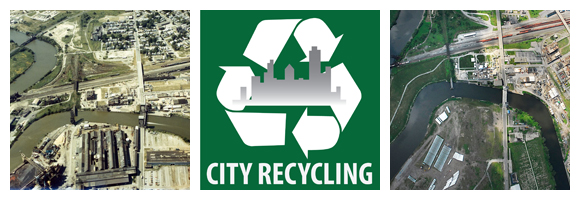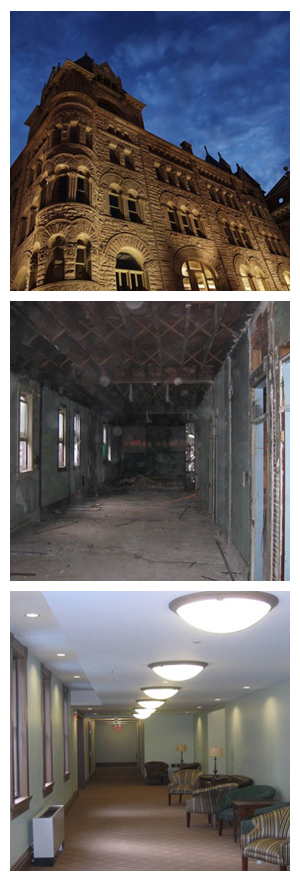
Abandoned industrial wastelands flipped into productive land like this site along the Buffalo River are spurring environmental, economic and cultural revitalization in cities across the Great Lakes. Photos: South Buffalo Development Corp. Illustration: John Kalmar
Editors note: This is the first of a series of stories about innovative ways of recycling abandoned urban land in the Great Lakes region.
Abandoned urban lots are community eyesores that increasingly represent economic opportunity.
Neglected, ignored and often contaminated with toxic chemicals, these so-called brownfields carry a lot of social ills, said Robert Colangelo, executive director for the National Brownfields Association.
But finding a way to reuse them is more important than ever.
“Brownfield redevelopment is always important, especially in a downing economy,” Colangelo said.
Over the next six days, Great Lakes Echo journalists will report on some of the region’s most innovative and creative city recycling projects. They show how brownfields are anything but wasted space.
Echo reporters visited and reported on redevelopment in:
- Chicago where a former paint factory is now the nation’s largest urban solar plant.
- Buffalo where an abandoned steel mill now boasts wind turbines, a dye factory is the future site of an historical railroad museum and an underwater brownfield redevelopment is being revitalized.
- Ponitac, Mich., where the film industry is finding an unlikely home at a former General Motors truck factory.
- Racine, Wisc., where local officials hope a $1 million loan program sparks restoration that provides job potential for a city facing high unemployment.
- Piqua, Ohio, where an ailing hotel that once hosted presidents and women’s rights rallies was restored as a cultural centerpiece.
- Detroit, where the urban farm movement has caught the attention of commercial entrepreneurs seeking profit in abandoned residential lots.
View Recylcing Cities in a larger map

A restoration project saved the former Fort Piqua Hotel from demolition. Photos: Bob Graeser
Such efforts are picking up steam.
“I think politicians are starting to recognize again the important role brownfield redevelopment plays in a community and how you can get multiple payback and leverage of investment by tacking these complicated projects, ” Colangelo said.
Job creation projects are a new source of investment. The American Recovery and Reinvestment Act in 2009 provided $100 million in funding to specifically support brownfield revitalization. State and regional environmental organizations provide grants and loans for cleanup as well.
But funding doesn’t always come from government programs. Sources are as creative as the uses. For example, in Piqua, Ohio, liquor bonds and a 10-day citizen fundraising drive were part of a pastiche of funding used to restore an historic hotel as a cultural icon.
And yet another source of renewal is the drive for alternative energy production in the heart of where it is most needed.
Henry Henderson, director of the Midwest branch of the National Resources Defense Council, calls that turning brownfields into brightfields.
“Recycling is too often viewed as paper, glass and plastic,” Henderson said. “We need to think of recycling the places we as humans decided to settle. Instead of being a burden on the surrounding communities, it would revitalize them.”
More from this series:
- Buffalo brownfields link past industry to hope
- Solar power transforms a Chicago brownfield into a shining brightfield
- Community support, diverse funds save historic building from demolition
- Officials hope former truck factory helps make Michigan a movie star
- Federal loan brings employment hope to Wisconsin brownfields
- Detroit businessman proposes large scale commercial farm to struggling city
We developed a low cost remedy that will eliminate PCBs from the Kalamazoo River, the RP wasn’t interested.
We developed an effective low cost remedy to eliminate DDT and other persistent pesticides on the Pine River, the RP’s trustee could care less.
We developed a remedy to reduce dioxins in the Tittabawassee River below Midland, the RP pulled its support.
The environmental industry and Brownfields isn’t about restoring our contaminated and blighted cities, it’s about entrenched environmental industry interests, protecting revenue streams and long term billable hours. Real progress won’t be made until this situation is remedied.